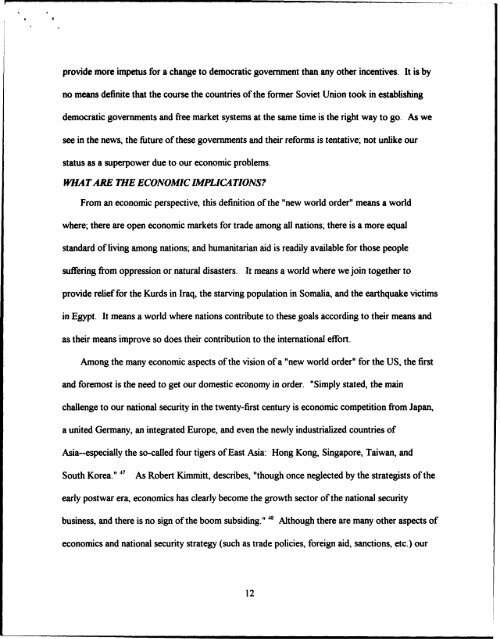"New World Order" And Its Implications For US ... - The Black Vault
"New World Order" And Its Implications For US ... - The Black Vault
"New World Order" And Its Implications For US ... - The Black Vault
You also want an ePaper? Increase the reach of your titles
YUMPU automatically turns print PDFs into web optimized ePapers that Google loves.
provide more impetus for a change to democratic government than any other incentives. It is by<br />
no means definite that the course the countries of the former Soviet Union took in establishing<br />
democratic governments and free market systems at the same time is the right way to go. As we<br />
see in the news, the future of these governments and their reforms is tentative; not unlike our<br />
status as a superpower due to our economic problems.<br />
WHAT ARE THE ECONOMIC IMPLICATIONS?<br />
From an economic perspective, this definition of the "new world order" means a world<br />
where; there are open economic markets for trade among all nations; there is a more equal<br />
standard of living among nations; and humanitarian aid is readily available for those people<br />
suffering from oppression or natural disasters. It means a world where we join together to<br />
provide relief for the Kurds in Iraq, the starving population in Somalia, and the earthquake victims<br />
in Egypt. It means a world where nations contribute to these goals according to their means and<br />
as their means improve so does their contribution to the international effort.<br />
Among the many economic aspects of the vision of a "new world order" for the <strong>US</strong>, the first<br />
and foremost is the need to get our domestic economy in order. "Simply stated, the main<br />
challenge to our national security in the twenty-first century is economic competition from Japan,<br />
a united Germany, an integrated Europe, and even the newly industrialized countries of<br />
Asia--especially the so-called four tigers of East Asia: Hong Kong, Singapore, Taiwan, and<br />
South Korea." 4' As Robert Kimmitt, describes, "though once neglected by the strategists of the<br />
early postwar era, economics has clearly become the growth sector of the national security<br />
business, and there is no sign of the boom subsiding." " Although there are many other aspects of<br />
economics and national security strategy (such as trade policies, foreign aid, sanctions, etc.) our<br />
12

















